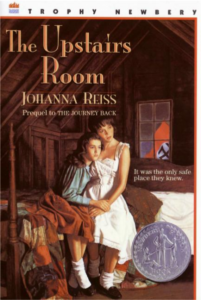The Upstairs Room by Johanna Reiss
 I am trying to improve my free time. What better way to improve my free time than to read more? It is a little difficult to read with multiple children crawling over me and vying for my attention. That’s okay, this super woman can do it all. And so I will be giving brief book reviews as I complete each book. (Don’t expect them too often, but as long as I am encouraging my kids to read more this summer, I will too.)
I am trying to improve my free time. What better way to improve my free time than to read more? It is a little difficult to read with multiple children crawling over me and vying for my attention. That’s okay, this super woman can do it all. And so I will be giving brief book reviews as I complete each book. (Don’t expect them too often, but as long as I am encouraging my kids to read more this summer, I will too.)
This week I finished The Upstairs Room by Johanna Reiss and I would highly recommend it. Suggested for 8-12 year old readers, it was insightful for adults as well.
Introduction by the author
“This book is about my life, or rather part of my life, the part that took place in Holland during the Second World War. In this book I have gone back to those years when I was a child, and Jewish, and therefore undesirable, when I had to hide from the Germans.
I have not tried to write a historical book, although it may have some historical value. What I did try to write was a simple , human book, in which my sister an I suffered and complained, and sometime found fault with the Gentile family that took us in for a few years, in which the members of that family were not heroes but people, with strengths and weaknesses. -Johanna Reiss”
STYLE
I had a hard time with the book’s literary style. It is neither a “diary” nor a story with proper dialogue. It isn’t even written in a “my memory” format. Instead, the author writes in first person, and mixes thoughts and dialogue in a confused and vague manner. However, once I familiarized myself with this slightly confusing style, I became enthralled with the message.
Content
The book roughly covers a four year period beginning in 1940 when Germany invaded Holland. The narrator, Annie de Leeuw, is 8 years old when the German occupation puts her Jewish family in danger. After two years, they separate and go into hiding. Annie (now age 10) and her older sister, Sini (20), head to a farming community together and spend the next two years hiding upstairs.
The book is fairly uneventful, although tension mounts when the Nazi’s move their headquarters downstairs. Even so, the author draws the reader into the world she experienced and had hoped to forget. I found myself wondering how I would do in a similar circumstance. Would I be brave and defiant? Or weak and fearful?
The author genuinely moved me. I ached for these young girls who never got to go outside to play, never got to make friends, and who had so little exercise that their muscles atrophied. I felt their hopelessness as each season passed with no sign of deliverance. And when the Allies finally arrived and liberated their village, the author does a marvelous job of helping me feel the girl’s trepidation to leave the house after such a long confinement.
As I read I found myself constantly stopping and asking Jax: “What would this be like? If you could only have one book while in hiding, what would it be? Can you imagine two months in bed just to stay warm and undetected? How would it feel to just leave the house after such a long isolation? How would it be to find out your neighbors had hidden Jews for two years? What would it be like…”
Recommendation
I give The Upstairs Room 10 out of 12 buttered rolls. It is a thought provoking book and the content is presented in an appropriate manner for children. However, I suggest you read it before offering it to your child so you are able to discuss it together. And be aware it is not in an easy to read, “novel” format.
